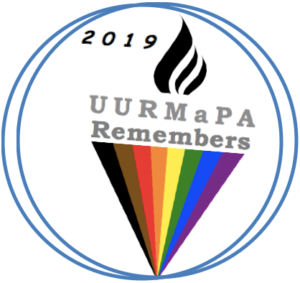In recognition of the 50th Anniversary of the Stonewall Uprising in 2019, the UU Retired Ministers and Partners Association is sponsoring a new history project and two conferences focused on the history and stories of LGBTQIA ministers, their partners, and allies.
The UU Rainbow History Project is beginning by collecting memories, photographs, sermons and other memorabilia for this website and social media. All of the materials we gather will be placed in the UURMaPA archives at the Andover-Harvard Theological Library Archives unless you specify that you want them back. To contribute your stories and other materials, please send them to our Coordinator, at coordinator@uurainbowhistory.net and to the book editor, Diana McLean, at editor@uurainbowhistory.net.
 We have also gathered resources from our two conferences, held in February and October, 2019.
We have also gathered resources from our two conferences, held in February and October, 2019.
The first conference was held at the Newcombe Tennis Ranch in New Braunfels TX, February 17-20. Keynote: Keith Kron, Director of the Transitions Office and former Director of the UUA Office of BGLT Concerns. Theresa Novak, Minister Emerita of the UU Church of Ogden UT, shared her Odyssey.
The second conference was held Oct. 7-10, 2019, at Wisdom House in Litchfield CT. Keynote addresses were offered by Meg Riley and F. Jay Deacon, both former Directors of the UUA Office of LGBT Concerns (under various names). The Odyssey was given by Mark Belletini, former Senior Minister at the First U.U. Church of Columbus, OH.
Both four-day, three-night conferences included stories from living pioneers of the LGBTQIA movement, workshops, and other activities. Attendees were UURMaPA members, UUMA members and partners of retirement age, and (for the main program day) ministers, aspirants, and partners of any age.
Though the conferences are over, we are still collecting your memories, stories, and materials in order to recognize and capture our amazing history of transformation into a truly welcoming faith community, both within Unitarian Universalism and as an influence on the wider culture of the United States.
The project is supported in part by a grant from the UU Funding Program.
